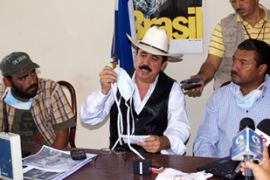Honduras lifts rights restrictions
Roberto Micheletti cancels decree limiting freedom of speech, assembly and movement.

OAS-led negotiations
The restrictions are expected to be lifted in full by Tuesday, but Monica Villamizar, Al Jazeera’s correspondent in Tegucigalpa, said some people had already begun taking to the streets.
| In video |
|
Zelaya supporters fear for their future |
“People are re-organising the protests – they want to re-start their resistance [to the de facto government],” she said.
“Some of the media outlets [loyal to Zelaya] had been shut down [during the emergency measures imposed by the de facto government].
Some of the pro-Zelaya protests had been organised through these outlets, so the voice of the resistance was effectively cut-off.”
Zelaya, who has been sheltering at the Brazilian embassy in the Honduran capital Tegucigalpa since he returned home two weeks ago, had called for Micheletti to rescind his decree before negotiations to tackle the political crisis begin.
A delegation of foreign ministers from member states of the Organisation of American States (OAS) is to broker talks between the de facto government and Zelaya on Wednesday.
A proposal by Oscar Arias, the president of Costa Rica, that Zelaya be reinstated before elections scheduled for November 29 is likely to form the basis of the OAS-brokered talks.
Embassy surrounded
Zelaya is blocked by the Honduran constitutuion from holding another presidential term, but Arias’ proposal suggests that he resume the presidency until an elected successor takes office.
The ousted president has called on the de facto government to “immediately” sign the Arias proposal, but Micheletti has maintained his opposition to Zelaya re-taking power.
Honduran security forces are continuing to surround the Brazilian embassy compound, where Zelaya and about 60 aides have been holed up.
Zelaya was ousted from the presidency by a military-backed coup on June 28, the same day that he planned to hold a non-binding referendum on the constitution.
The military, courts and opposition politicians accused Zelaya of trying to extend presidential term limits via the referendum.
Zelaya said that the public vote was aimed at improving the lives of the poor in Honduras.